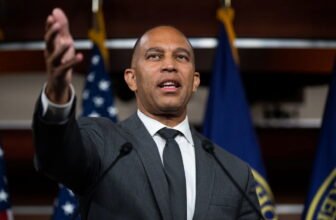
June 15, 2025
New organizations are putting Black fathers and their children at the forefront of the autism conversation.
With the realities of raising children with autism more prevalent than ever, Black fathers are sharing their support and perspective.
Tyrone Green, a Black father to a three-year-old boy living with autism, did not know where to turn when he learned of his son’s diagnosis. He felt loneliness regarding his aspirations for his son, and how his new reality could change these dreams.
“(M)y wife couldn’t understand what I was going through as a Black father, all these hopes and dreams I had for my kid,” explained Green to AP News. “She didn’t feel the same way.”
Instead of staying in this state of hopelessness, the Michigan resident found a community that understood his unique plight. He joined a Black fathers’ support group in 2021, creating a podcast two years later that speaks on Black fatherhood and autism. Called AutisHIM, the show centers on the all-encompassing reality on raising children with the developmental condition.
Autism, also known as autism spectrum disorder, is a neurodevelopmental disorder that can affect people’s social skills, communication, and learning capabilities. As autism exists on a spectrum, how it impacts those who have it can vary greatly.
Furthermore, studies have detailed that autism prevalence is higher among Black children than their white counterparts, as confirmed by Autism Speaks. However, systemic biases have led to delayed diagnoses, furthering complicating the journeys of Black children who actually have the condition.
Given these barriers, Black fathers like Green are creating a space for these conversations as committed parents. They also encourage hesitant Black dads to speak up about their emotions, fears, and hopes for their children beyond the diagnosis.
While political leaders like Health Secretary Robert F. Kennedy have disregarded autism as a “tragedy,” Black fathers are aiming to change the narratives on their children. One professor emphasized the importance of Black dads staying engaged in these health conversations, while understanding that people with the disorder can still live full lives.
“The challenge is convincing people to (talk openly and honestly), because the practice of doing that is rare, not just among Black men, but people in general,” shared Michael Hannon, a counseling professor at Montclair State University who studies the social and emotional aspects of autism on Black fatherhood.
Other organizations have expanded their messaging to bring more Black fathers of autistic children into the community. Dr. Berry Pierre, co-founder of Autism in Black wit his wife, Maria Davis-Pierre, wants to promote how Black fathers are very engaged in their children’s education and futures.
“The dads are there, but we know the general public doesn’t realize that yet,” shared Pierre. “So we try to serve as this engine to shine a light on what’s really happening. The dads are there, they’re attentive. And even with this diagnosis, they’re going even harder.”
From nonprofits to podcasts, these Black father-led circles are providing a sense of hope, upliftment, and inclusivity to the evolving Autism community.
RELATED CONTENT: Black Fathers Rock! Celebrates Black Fathers, Fights Against Stereotypes






